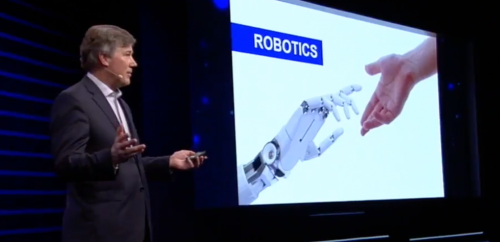Last month, attendees at The Near Future in Washington, D.C. were treated to talks from world-renowned technology, innovation, and business experts who presented on how technologies of the future will one day change how we live, learn, work, and play. They brought on stage the latest in virtual reality, augmented reality, holograms and artificial intelligence and shared how these technologies are already transforming the world around us. Speaking at the event was Dr. Wyatt Decker, Vice President of the renowned Mayo Clinic and Emergency Physician, who highlighted how next-generation technologies are changing medical care, disease management, and helping us lead healthier lives.
“There are innovations happening in cancer care, in genomics, in the ways we communicate to our healthcare provider that are making it easier and less expensive for all of us,” said Dr. Decker, in an interview with NCTA. “Imagine how important it would be, as a patient, to know ahead of time what sort of illness you might be dealing with, what the prognosis is, etc. And that’s just the beginning [with genomics].” Dr. Decker added that big data analytics and AI will also play big roles in transforming healthcare in the next several years.
During his presentation, Dr. Decker showcased examples of the type of patient care that is already taking place with advanced technology. Amputees who have difficulty using prosthetic limbs will benefit from innovations in robotics, allowing patients to feel as though their limbs were natural and better functioning. Patients undergoing surgery will also benefit from 3D printing. Dr. Decker held up a 3D replica of a police officer’s liver, whose cancer had metastasized. The 3D replica allowed the surgical team to rehearse the operation multiple times. The surgery resulted in a healthy and cancer-free patient.
3D modeling, or tractography, is also being used in neurosurgery to precisely map the human brain. Decker showed how neurosurgeons used this technique to operate on a woman’s brain while she was simultaneously playing the piano, so as to carefully avoid the parts of her brain that allow her to perform her instrument. Lastly, Dr. Decker showed off the future of smart surgical instruments, which will help doctors to avoid damaging certain areas through alerts and signals sent through the instrument as it maneuvers through a surgery.
With all of these exciting developments underway, Dr. Decker said that it’s important to have a collaborative regulatory environment in order to keep innovation moving forward: “We need some regulations as guardrails for safety of our nation’s citizens. But we also need to work with the FDA and other regulatory bodies so that we can accelerate and streamline the regulatory process, so that good ideas that are going to help people can get out there quickly.”
“There’s a lot of white noise in healthcare these days, particularly healthcare policy. Those are serious issues we need to grapple with,” Dr. Decker told the audience, in closing. “But I wouldn’t want any of us to forget the incredible exciting near future in healthcare as all of these technologies mature.”
that.
A video of Dr. Decker’s presentation is available below:
This blog also appeared in CTAM Smartbrief. To sign up, click here.
